- Home
- Darrell Maloney
This Changes Everything Page 14
This Changes Everything Read online
Page 14
Some are hardcore and seem to have bad attitudes. They place themselves on a pedestal and insist they be treated with deference. They see themselves as almost a king; everyone else their peons.
In the United States these generals are tolerated but not loved. And neither are they respected.
Generals who are considered too soft, on the other hand, are loved but not respected.
In the Air Force generals are respected only if they’ve earned their stars and if they’re viewed as just and fair.
Airmen like their generals to have earned their wings. Rated officers who flew in at least one war. Preferably two. And who flew with distinction.
They didn’t fly milk runs in and out of established air bases far behind the lines.
They weren’t Air National Guard “weekend warriors” who flew cargo planes their entire careers, or what the Air Force calls “heavies” because they couldn’t handle the speed and danger of the fighter jets.
No, the generals airmen respect are the fighter jocks who fly the dangerous missions in the chaos of war. The missions nobody really wants to fly, but that someone has to.
The pilots who fly such missions and then volunteer for the next run. Who know they could get a pass and let somebody else take a turn, but who volunteer to go back. Because now they're the one who’s actually been there before, who has seen the target first-hand.
The pilot who wants to go back because it makes more sense for him to go even though it’s someone else’s turn…
Those pilots are the ones airmen want to someday become their generals.
-44-
The problem (if one can call it that) is that there a lot of gutsy such pilots in the United States Air Force.
And there are very few generals, so most of the pilots serve with distinction, then eventually bid the Air Force goodbye and transition into something else.
A few of them never want to leave, for flying’s in their blood. They desperately search for a way to stay in the Air Force even as they get older and they don’t get the chance to fly as often.
Some of them who display the proper skill set transition into the higher ranks as wing or group commanders.
Then as base commanders.
Then as the commanders of numbered air forces and major commands.
They serve duty at the Pentagon or as deployed commanders in combat theaters.
Eventually, provided they outlast most of their peers, they start getting their stars.
And people start to treat them like gods.
Some go bad at that point, believing all the positive press. Their egos get overblown, they become more demanding, and they gain reputations for being difficult.
And they become those generals airmen only tolerate until they go away.
Most of them, though, continue to live the lives which got them their invitation to the party.
They’re unpretentious and selfless.
They’re modest to a fault, sometimes even blushing when praise is heaped upon them.
They say things like, “I didn’t succeed. My men did. They did this, not me.” And they mean it.
In the modern day United States Air Force those are the kinds of generals who earn the love and respect of their men.
And those men will follow them anywhere.
Major General John Stephens followed that path. He flew the F-117 Nighthawk, more commonly known as the Stealth Fighter, in the skies over Baghdad in Desert Storm.
He flew the F-16 Falcon over Afghanistan and the F-22 Raptor over Syria. The Syria flight, in 2012, was his last sortie, for the Air Force doesn’t like its one-stars flying in combat.
By the time Saris 7 struck the earth Stephens had his second star and was quite comfortable, having transitioned from the cockpit to one of the top positions in the military.
He was in line to take a third star and become the Deputy Chief of Staff, working directly under General Mannix, when the first meteorite crashed in northern China and ruined everything for everybody.
Since that time he’d been doing his level best to keep the airplanes at Hill Air Force Base in Utah flying and his people alive and thriving.
He’d apparently done his job well, because despite the chaos the two meteorites brought with them, most of Hill’s aircraft were still operational.
And his base had somehow defied the odds, boasting the highest survival rate of any of the military bases.
Granted, a survival rate of twenty percent was dismal. But it was a number twice as high as most other bases, and twice as high as most cities.
As for the general thinking about generals, Stephens had his own system of measuring.
By his thinking, there were two types of generals in the United States military.
The first was a general who remained seated when a visitor of lesser rank walked into his office.
Such a general thrived on the worship his underlings placed at his feet. He typically saw himself as being better than others. Worthy of praise. He expected those of lesser rank or status to kiss his ring. Figuratively, of course. He played favorites among his charges, based upon their deference to him.
Those who praised him got the best assignments, the easiest additional duties or details.
Those who didn’t get the crummy jobs or the details no one else wanted.
The other type of general stood up from his desk when a visitor walked into the room.
Even when protocol didn’t require him to do so.
Not only that, he walked around his desk to greet the visitor.
He extended his hand to show the visitor he was welcome.
He smiled a broad smile. One which was heartfelt and sincere.
He made the visitor, whether he was a flag officer or an airman basic, feel special.
He made the visitor feel that, regardless of his position or rank or station in life, at this moment in time he had the general’s full attention. He had this general all to himself, for as long as he needed.
That, in Stephens’ opinion, was a general worthy of his position.
Major General John Stephens was one of those generals.
In normal times, meaning when the earth hasn’t been clobbered by meteorites twice in twelve years, military generals are well known.
If not personally at least by reputation.
Before Saris 7 struck the earth, anyone who wasn’t familiar with Major General John Stephens could Google him.
Or look him up on AirForce.com.
Or read one of the hundreds of articles about him on the internet.
These days the internet was dead.
Likely permanently.
In the old days, Plan B might be to pick up the phone and to call an old friend at General Stephens’ base.
To ask for a personal rundown of the type of commander he was.
And a personal opinion on what type of man he was.
While this Plan B might be possible, it was no longer feasible.
In an Air Force where few people survived, most “old friends” at Hill AFB were no longer answering their phones.
At least the old friends of Captain Robert Aduddell.
It was for that reason that he, after spending two hours pressing his uniform and shining his shoes in anticipation of meeting a hard-assed two star general, was pleasantly surprised.
Surprised when the general greeted him as an old friend, even getting up and walking around his desk to offer him a handshake.
But he hadn’t seen anything yet.
-45-
“Hello, Captain. Always nice to meet a fellow officer, and a fellow alumnus.”
“Um… excuse me, general?”
“University of Southern California, class of 1990, correct?”
“Um… yes sir. How did you…”
“Oh, come on, Robert. You didn’t think I made general by not doing my homework, did you?”
He gave the captain no chance to respond before continuing with the banter.
“Have a seat
, make yourself comfortable. Do you prefer Robert or Bob?”
“Um… Robert…”
“Okay, Robert. As for myself, you can call me general or sir…”
Stephens waited just a moment for his words to sink in.
“Oh, lighten up, Robert, it’s a joke! Probably my favorite general joke. And a damn sight nicer than most of the general jokes the enlisted folks come up with.
“Can I offer you something to drink?”
“Um… no, thank you sir.”
“Good. I have nothing against a shot at the end of a long day to help one relax. But it should be used in moderation.
“Do you agree, Robert?”
“Yes sir… um…”
“You may speak freely, Robert. Let me have it.”
There were just a few seconds of hesitation, then, “I’m sorry, sir. This wasn’t what I expected. I expected something more… formal.”
“You think I’m being overly friendly, Robert?”
“Well… yes, sir. Something like that.”
“You feel I’m setting you up? Making you think I’m a nice guy? Leading you to slaughter like a defenseless little lamb?”
“Um…”
“That’s okay. You don’t have to answer. I understand you probably had no clue how you’d be received when you walked in that door.
“Let me back up just a bit, Robert.
“I’m not setting you up. And I’m not going to slaughter you.
“But you’re the chief prosecutor in a capital case. The biggest case the Air Force has tried in many years.
“It’s imperative that we have an open line of communication. It’s imperative we’re able to speak freely, to voice our opinions and feelings about this case, without fear of reprisals or adverse actions.
“In short, I need to feel you have the guts to tell me if there are any holes in your case. I need to know that you’ll tell me if you feel any undue pressure to do anything unethical or beneath you just because you know General Mannix is pushing for a conviction.
“I need to know that you will prosecute this case to the very best of your ability, and will try your best to convict two officers who are three grades above your pay level and possibly send them to their deaths.
“And at the same time I need to know that you will give them a fair trial, free of prejudice, deference to the officers appointed over you, or any other factors not appropriate or not in line with the UCMJ or MCM.”
Captain Aduddell swallowed hard. He suddenly wanted to be somewhere else.
Anywhere else.
“Can you make me that promise, Robert?”
“Yes sir.”
“This is important, Robert. This is your one chance at a pass. If you feel you’re incapable or you’re unwilling to meet those criteria, now’s your one chance to say so. It’s your one opportunity to get out without consequence. Your only opportunity to walk away.”
He paused for just a few seconds for dramatic effect.
And to let the captain squirm just a bit longer.
“Now then, Robert. Are you absolutely sure you can make me that promise?”
“Yes sir. You have my solemn oath.”
“Good. Because if we’re going to proceed with this case, we’re going to do it right.”
“Yes, sir.”
The general seemed to relax a bit. Captain Aduddell seemed to sense the worst was over and followed suit.
“Okay, Robert. I want you to make me one more promise.”
“Yes sir?”
“I want you to promise me you will not shield me from your feelings regarding the prosecution of this case. Good feelings or bad, it doesn’t matter.
“If you feel at any time these men are innocent and shouldn’t be prosecuted, I want to know it immediately.
“If you decide in your own mind they’re guilty as hell and should be shot I want to know that too.
“Have you formed an opinion yet, one way or the other?”
“No sir.”
“Good. I’d have lost a lot of respect for you if you had.
“If you catch wind of any unethical behavior, on either side, any fabricated evidence, any prosecutorial misconduct, any evidence of perjury by any party, I want you to tell me immediately.
“Can I also have your solemn oath on that?”
“Yes sir. Absolutely.”
“Good. Then together we’ll make sure that justice is served. We’ll make sure the accused are found guilty and are punished, but only if they are indeed guilty.
“If the evidence shows they are not guilty we will work just as hard to ensure they walk out of the courtroom free men.
“Agreed?”
“Yes, sir.”
“Okay, good. Did you bring the charge sheet with you?”
“Yes sir.”
“Then let’s get to work.”
-46-
As it turned out, the two of them… General Stephens and Captain Aduddell… were on precisely the same sheet of music.
Both were honorable men.
Both believed the justice system must prevail in all endeavors. But that it must try its cases fairly, for it wasn’t about who won their case and who lost.
In the end it all came down to one question: was justice served?
Neither man was willing to cheat or cut corners to either convict an innocent man, or to let a guilty man walk.
Both would do their level best to uphold the rule of law. To let each side present their evidence and examine their witnesses, and to let the chips fall where they may.
General Stephens, although he had no legal training, had presided over a lot of courts martial in his long and distinguished career.
He’d administered a lot of Article 15 punishments as well, usually for minor transgressions of enlisted personnel.
He had vastly more judicial experience than Captain Aduddell, who went to law school but had darned few prosecutions under his belt.
“That’s okay,” the general said when the captain voiced some concern about his lack of courtroom experience.
“Just follow your training, don’t do anything unethical, and let your conscience be your guide.
“You do those three things and you can’t go wrong. You may not win your case, but you will have done your job. And that’s vastly more important.”
“Yes sir.”
BG Stephens had been a bit worried.
Many military prosecutors are aggressive, “gung-ho” types who have a “win-at-all-costs” mentality. He’d tried several cases in the past where he had to reign in prosecutors who were trying to play fast and loose with the rules.
Especially the ones which pertained to shared evidence and discovery.
It had the potential of being especially bad because this was a capital case.
The defendants’ lives were on the line. If the prosecutor won his case there was a very good chance two men would die a horrible death.
That was very rare in the United States military.
Most military prosecutors worked their entire careers and never tried a capital case.
Most didn’t know anybody who tried a capital case.
A certain type of man might volunteer to try one, thinking it might boost his career.
He might be known as the man who convicted this man of mutiny, or that man of terrorism.
In his mind, that would be the pinnacle of his career. He’d be a hero in the military justice field. He’d get to pick his assignments, write his own ticket.
General Stephens was afraid the prosecution team would be led by such a man, who begged his way into the role by cashing in IOUs or favors owed.
The general’s first course of action, if that had been the case, would have been to quash the man’s hopes and dreams by firing him on the spot.
For while such a prosecutor might be the most talented litigator around and have much more experience than anyone else available, he’d be in it for all the wrong reasons.
And Stephens loved h
is Air Force too much to let some John Wayne- type burst in and sully its reputation.
Captain Aduddell, from all indications, was ideal for the job. His gut confirmed the assessment.
These two would get along great.
That didn’t mean, necessarily, that they wouldn’t butt heads occasionally; either during the trial or during the run-up.
But those would stem from procedural questions.
Stephens was quite sure he wouldn’t have to reprimand Aduddell for any blatant errors or shady behavior.
“Now then,” he told Aduddell. “I’ll want to meet your co-counsel, but just so I’m familiar with their names and faces.”
Aduddell felt comfortable enough with the general to chance a question some might view as a bit snarky.
“So… no third degree for my assistants then?”
The question was also a bit risky, for if the general had been in a testy mood he might have jumped down the junior officer’s throat.
Instead he just smiled.
“No third degree. Part of your job as lead is to keep your people in line and on task. It’s not my job to do that for you, and from what I see you seem up to the task.
“Now then, have you conferred with the ADC?”
“Not formally, no. I wanted to see you before any negotiations to get your general feelings on the case.”
“Negotiations?
“Do you think they’ll try to work a plea deal on a capital case?
“Interesting…”
The general leaned back in his chair and looked toward the ceiling, pondering the possibility a man so desperately wanted to avoid the firing squad he was willing to spend the rest of his natural life in prison; obviously the only other option.
“Not overtly,” Aduddell replied.
“I’ve heard some rumors. Rumblings of rumors, actually. Supposedly Colonel Medley feels that being tied to Colonel Wilcox is going to doom him. Wilcox is apparently not a very likeable man around here, it seems.”
“So I’ve heard.”
“What I’ve heard is that Medley is going to ask to be tried separately, and will try to arrange a deal for a lesser sentence.”
“Based on what, exactly?”

 A Perilous Journey
A Perilous Journey The Yellowstone Event: Book 6: The Aftermath
The Yellowstone Event: Book 6: The Aftermath Eden Bound
Eden Bound Without Warning
Without Warning Everything Has Changed
Everything Has Changed Rest in Peace
Rest in Peace This Changes Everything
This Changes Everything The Final Chapter
The Final Chapter It Can't Be Her
It Can't Be Her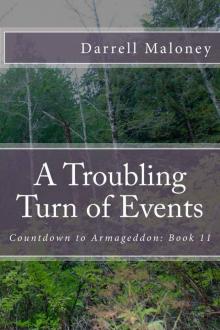 A Troubling Turn of Events
A Troubling Turn of Events The Blockade
The Blockade A Tearful Reunion
A Tearful Reunion Countdown to Armageddon
Countdown to Armageddon Alone, Book 3: The Journey
Alone, Book 3: The Journey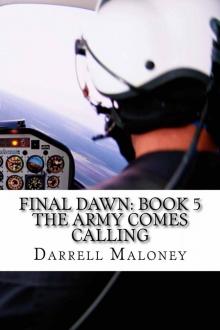 The Army Comes Calling
The Army Comes Calling The Grim Reaper Comes Calling
The Grim Reaper Comes Calling Her Name is Beth: Alone: Book 5
Her Name is Beth: Alone: Book 5 Red: The Adventure Begins
Red: The Adventure Begins Rise From The Ashes: The Rebirth of San Antonio (Countdown to Armageddon Book 3)
Rise From The Ashes: The Rebirth of San Antonio (Countdown to Armageddon Book 3) An Unkind Winter (Alone Book 2)
An Unkind Winter (Alone Book 2)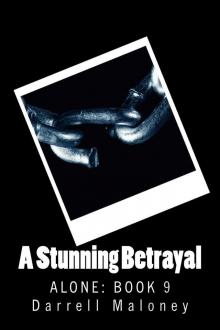 A Stunning Betrayal: Alone: Book 9
A Stunning Betrayal: Alone: Book 9 A Whole New World: Ranger: Book 2
A Whole New World: Ranger: Book 2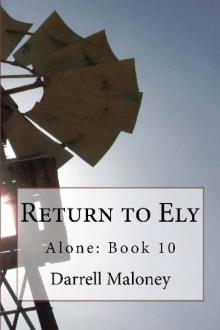 Return To Ely
Return To Ely A Lesson Learned: Red: Book 3
A Lesson Learned: Red: Book 3 The Homecoming: Countdown to Armageddon: Book 5
The Homecoming: Countdown to Armageddon: Book 5 Final Dawn: Book 12: Where Could He Be?
Final Dawn: Book 12: Where Could He Be? An Acquired Taste
An Acquired Taste On Desert Sands: Alone: Book 6
On Desert Sands: Alone: Book 6 The Battle: Alone: Book 4
The Battle: Alone: Book 4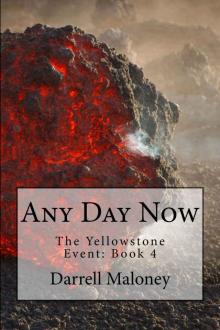 Any Day Now
Any Day Now Too Tough To Tame: Red: Book 2
Too Tough To Tame: Red: Book 2 No Help From Austin: Red: Book 5
No Help From Austin: Red: Book 5 An Unwelcome Homecoming
An Unwelcome Homecoming A New Start: Final Dawn: Book 9 (Volume 9)
A New Start: Final Dawn: Book 9 (Volume 9)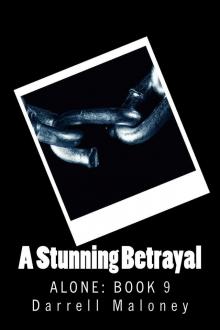 A Stunning Betrayal
A Stunning Betrayal An Undeclared War (Countdown to Armageddon Book 4)
An Undeclared War (Countdown to Armageddon Book 4) One of Our Own: Final Dawn: Book 11
One of Our Own: Final Dawn: Book 11 Texas Bound: Alone: Book 11
Texas Bound: Alone: Book 11 Payback: Alone: Book 7
Payback: Alone: Book 7 The Quest: Countdown to Armageddon: Book 6
The Quest: Countdown to Armageddon: Book 6 The Siege
The Siege The Yellowstone Event: Book 1: Fire in the Sky
The Yellowstone Event: Book 1: Fire in the Sky Return to Blanco (Red Book 4)
Return to Blanco (Red Book 4) The Search
The Search AFTER THE DUST SETTLED (Countdown to Armageddon Book 2)
AFTER THE DUST SETTLED (Countdown to Armageddon Book 2) Death Comes Calling (Ranger Book 3)
Death Comes Calling (Ranger Book 3) A Long Road Back: Final Dawn: Book 8
A Long Road Back: Final Dawn: Book 8